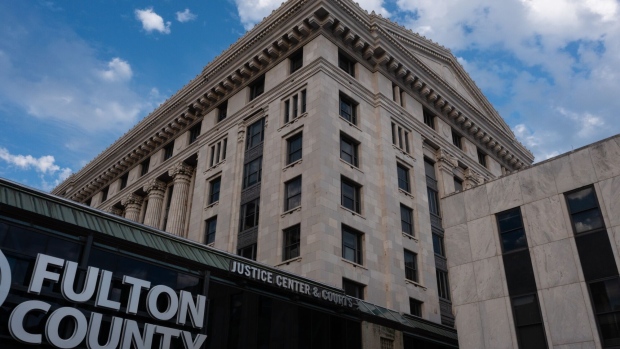Nov 15, 2023
Trump Ally’s Lawyer Admits Leaking Video Confessions to Media
, Bloomberg News

(Bloomberg) -- A lawyer for a Donald Trump ally indicted along with the former president in Atlanta on election-interference charges admitted that he leaked confidential video confessions.
The admission by a lawyer for former Coffee County elections supervisor Misty Hampton came at a hearing on an emergency court order sought by Fulton County District Attorney Fani Willis after ABC and other news outlets published the videos this week.
“So that I can go sleep well tonight, judge, I did release those videos to one outlet and in all candor to the court, I need the court to know that,” Hampton attorney Jonathan Miller said Wednesday in a video hearing.
The Georgia case is one of four criminal proceedings Trump is facing in state or federal courts. Willis predicted that any trial of the former president and his allies by her office could run into 2025.
Superior Court Judge Scott McAfee said he will sign a protective order to prevent similar unauthorized disclosures of pre-trial evidence, which Willis had sought before Miller leaked videos turned over to defense lawyers. The videos were of confessions four co-defendants gave to prosecutors before pleading guilty.
The order will allow prosecutors to designate material as sensitive, and defense lawyers can object, with the judge resolving disputes. Willis said in an emergency motion filed Tuesday that the release was “clearly intended to intimidate witnesses in this case, subjecting them to harassment and threats prior to trial.”
Miller defended his conduct at the hearing, saying he did nothing wrong and the public had a right to know about the high-profile case in which the former president and 18 allies were indicted on racketeering and other charges.
Four of them pleaded guilty and made confidential confessions before they made public admissions in McAfee’s courtroom. Those who pleaded guilty were attorneys Sidney Powell, Kenneth Chesebro and Jenna Ellis, as well as Atlanta bail bondsman Scott Hall.
Attorney Tom Clyde, who represents the Atlanta Journal-Constitution and other media outlets, argued that Georgia law didn’t support the entry of any protective order. But McAfee disagreed and said he would sign an order based largely on one negotiated by the defense lawyers and the prosecutors.
©2023 Bloomberg L.P.


